Many of
us remember Lucie Arnaz as the mini-skirted, go-go-booted sidekick
on Here’s Lucy (1968-1974). Despite being the offspring of
legendary entertainers Lucille Ball and Desi Arnaz, Lucie has
managed to carve her own indestructible perch in the family tree.
Multi-talented and unfamiliar with the word “quit,” she
has conquered everything from film, television and theater to
cabarets and recordings. She has also done much to keep her
parents’ legacy alive and iconic.
Her new
CD, entitled Latin Roots, is a nod to her musical heritage
via her Cuban-bandleader father. It was not only a labor of love,
but a family affair too: she pays respect to her father's music and
collaborates with her son on one track, called
“The Music
In Your Heart.”
In this
frank conversation, Lucie opens up about the challenge of being the
child of superstars (it’s not the easy breeze you might think), as well
as how her brother, Desi Arnaz, Jr., almost destroyed himself early
on. She also describes the shaky balancing of a demanding showbiz
career with attempting to raise a “normal” family.
In
addition, she mentions a mean nun and Super Nanny!
How did your Latin Roots CD take root?
I
recorded a CD about fourteen years ago [Just in Time,
released in 1993], and I fully intended to follow it up with a
Latin-themed CD. But life just got the better of me. I was in
Broadway shows, I was seeing my kids through college, and I ended up
going to London for a year and a half. Things just got in the way.
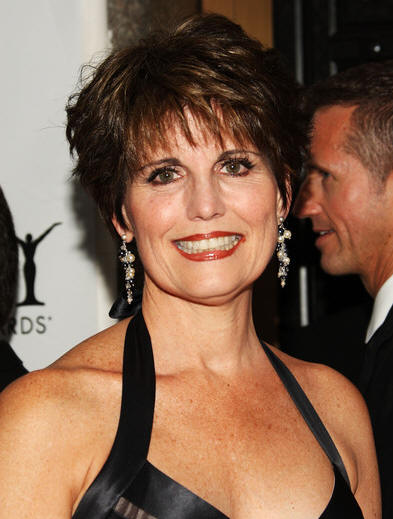 Then I
realized that the style of music that I was doing had sort of
evaporated from Billboard and all the regular charts. There
weren’t even that many radio stations in those days for these kinds
of easy-listening pop standards, so I wasn’t going to find out if my
song was a hit or not. I was just going to do it for the love of
doing it. So I didn’t focus on it a whole lot. I focused on other
things.
Then I
realized that the style of music that I was doing had sort of
evaporated from Billboard and all the regular charts. There
weren’t even that many radio stations in those days for these kinds
of easy-listening pop standards, so I wasn’t going to find out if my
song was a hit or not. I was just going to do it for the love of
doing it. So I didn’t focus on it a whole lot. I focused on other
things.
Then I
was at the 92nd Street Y Lyric and Lyricist event,
hosting an event for Ira Gershwin. I got to talking to the artistic
director there, about great arrangements and the people who have had
the opportunity to sing with just fantastic arrangers. All of these
vocalists have passed away, the Peggy Lees and the Frank Sinatras
and the Dean Martins and the Rosemary Clooneys. And I wondered,
‘what happened to those charts? Where did they go?’
My
father’s orchestra charts were in my garage for ten years. Michael
Feinstein told me that I really ought to deposit them somewhere
where they can be cared for over a long period of time. The Library
of Congress does that and they do it very well. So I did. I offered
it to them. They were great. They took them and they cataloged them
and protected them.
My
father’s music is what inspired me to put a nightclub act together
years ago. I have like 300 charts, and some of them I had never
heard.
For ten
years, I’ve been talking about doing this Latin music CD, and if I
don’t do it now, to coincide with this big show [BABALU:
The American Songbook Goes Latin - Featuring the Music of the Desi
Arnaz Orchestra.
This
premiered at the 92nd Street Y in January 2010],
I’d be crazy, because it’s the perfect time. So I did,
simultaneously, while putting together this huge mammoth show of
Dad’s music, fifteen-piece orchestra, two singers and two dancers.
You were able to collaborate with your son on this CD as
well. What was that experience like?
My son,
Joe Luckinbill is a wonderful guitarist. I asked him, “Do you think
you will have anything that your old mother would want to record?
That might lend itself to a Latin thing?” He sent me a track [which
eventually became “The Music in Your Heart”], and it was really
good, a great feel. I just wanted to get up and dance to it.
I wrote
lyrics to it, about Joe, about my father, and the muse and the music
that passes between the generations. Joe was with me when my father
passed away. He was only four and a half. He has just a tiny memory
of that. He grew up to become a guitar player and a musician and he
says that it’s a shame that grandpa isn’t here to hear him. And I
said, well, he is, sort of, he is here. This song talks to that.
When you think people who you want to be with your forever are gone,
it’s really not so. They are here.
So you do have a life philosophy.
You’re
never on this road alone. There is a part of you that is always
connected to that higher thing. I do have a spirituality that I
trust in, and I try to tune my kids into, to help them when I’m not
here.
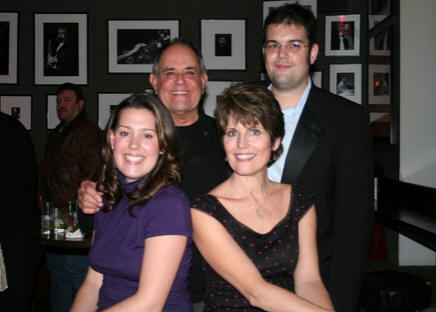 Do you see your parents in your own kids?
Do you see your parents in your own kids?
I see me
in them and I see my parents in them. Not just the facial features,
but the tenacity and the creativeness and the stick-to-itiveness.
And the adventuresome qualities.
How has it been for you to balance raising kids with
building a career?
My
husband [actor Laurence Luckinbill] and I had made a decision to
really be there for the kids. To take shows does not always mean
that you can still be available for a family. I’m asked, for
instance, “Do you want to go to London for six months and do
such-and-such a play?” I think, wow, that’s great, but then I had
just put my kids in a new school and my daughter has a piano
recital. That’s like a big deal. Once you make the decision to have
a family, you have to include those decisions in other decisions.
Your parents had to make those decisions when raising you,
and I’m sure it was especially difficult for them.
My
mother tried to be there for me, but she wasn’t always there and I
missed that. I lost a lot with that. I want to do better this time
around.
I work
hard to try to understand what kind of mother I am, and how to be
better at it. My mother intended to be the best mother in the world
and tried very hard to do that, but the truth of it is, when [she’s]
not home, things fall apart.
It
doesn’t matter what kind of great help you have. We had good help.
We didn’t have au pairs from hell or crazy people. We had good
people. But that’s not the same as having your parents at home. We
didn’t have the same kind of bonding. And I don’t have the memory
that teaches me how to be a parent when my kids are small, because I
don’t remember having a parent who was there with me.
I don’t
have any animosity. When I put that documentary together back in
1993 [Lucy and Desi: A Home Movie, available on DVD from MPI),
I had to put myself in their place and follow their careers, step by
step. Where did they go? What did they do? What kind of decisions
did they have to make? Wow, if I were them, with all that going on,
shit, I would have done the same thing. I would have made the same
exact decisions.
So I
don’t blame them for the decisions they made. They created a
wonderful show and a great household and they had two great kids.
The downside was they couldn’t be home. It wasn’t great but it
wasn’t tragic. In raising my own children, I really did not want to
miss the growing up.
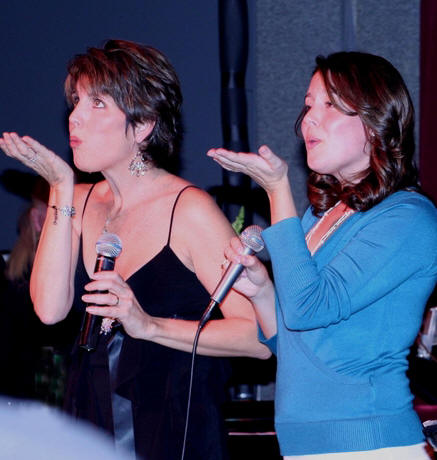 So how do you grade yourself so far?
So how do you grade yourself so far?
I
thought I was doing a great job of [parenting], but my kids started
telling me otherwise. It still wasn’t enough. I wasn’t there
enough. And they started to act out weird, getting in trouble at
school. A very wise child psychologist showed me what was going on.
He asked me, “How much time do you really spend with them?” And I
bit his head off. I said that I spend twice as much time with them
as my folks did with me.
Then he
asked, “So could you say that you spend fifteen minutes alone with
your kids every day?” And I had to think about that. Well, no, not
exactly. But that’s what makes them feel worthy of love. And that
blew me away. It totally blew me away. If you are not feeling
worthy, and not feeling worthy enough for someone to love you, then
you think something is wrong with you and you act out in all these
crazy ways.
I
decided that I was going to have no part of that. Regardless of my
profession, no matter how much I love the theater, I decided that
I’m not going to do that anymore until I solve this. My husband and
I, we left California, sold our house. We let go all of the live-in
people who were working for us, as swell as they were. We came back
to our little ranch house in Westchester. We built an office over
the garage. We’re still working people. We still make our living in
acting and in the theater. But if my husband gets a gig, I stay
home. And if I get an event, then he stays home. And we did that for
twelve years.
How do you deal with being a celebrity in a town where
there may be few if any celebrities?
It’s not
a big deal to me. I think I deal with it pretty well, but it’s not
easy for the kids. It was a different world when I was going to
school, in Los Angeles – Brentwood – where there were a lot of
people in the industry. People did not make fun of me because of who
my parents were. But today, kids are kind of cruel to one another
for some strange reason. It was very hard for my kids to just be
regular kids, because whatever they did that didn’t work out quite
right, it would be, “well, you rich kids.” It was hard for them, and
it still is.
You had to deal with cruelty as a child?
The only
memory I have of that happening is not with kids, not with parents
or friends, but with a nun at school! She was the epitome of the bad
nuns you would see in Nunsense. We had a lot of kids in our
class that were related to people in show business. The Catholics of
Beverly Hills, where are they going to go but to Catholic school?
She
would pick on Dean Martin, Jr., God bless him, when he was talking
too loudly in class, like kids tend to do. Instead of saying, “Shh,
you, Dean, you’re talking too loudly,” she would say, “I guess
because you think you’re so handsome, because you are Dean Martin’s
son, that you can talk louder.”
If I was
cracking a joke or making people laugh, she would say, “You’re
Lucille Ball’s daughter and therefore you must think that you are
very funny, but you are not Lucille Ball and you are not funny.”
This is a woman who had a lot of excess baggage.
Well, I
survived that, and I later went to Immaculate Heart High School,
which was all girls and all nuns. It had the best drama department
in all of Los Angeles. It proved to me that it isn’t the nuns who
are wrong; it is just certain people who become nuns.
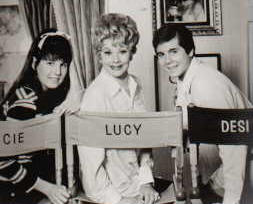 What was it like to be a regular cast member on your
mother’s series (Here’s
Lucy)?
What was it like to be a regular cast member on your
mother’s series (Here’s
Lucy)?
It was a
good way to learn. You have to show up on time. You have to learn a
certain amount of lines. You have to know what you are supposed to
do, and to not trip over the furniture. You have to learn to be a
good professional sport.
It was
like a variety show. It was rather uncommon in those days and very
uncommon now. Who can spend the money to do all those musical
numbers today? It would cost a fortune.
It was a
tremendous education for me. I had no idea how much fun it was going
to be. Every week [she] had some kind of guest star, whether it was
a famous-famous person or someone not-super-famous but who was a
great actor. I learned from those people too.
Every
week I got to watch and learn. For instance, here’s the biggest star
in show business and they are kind to everybody and they know their
stuff and they memorize their blocking and their lines and it’s a
snap. And yet here’s this other star who is angry all the time and
blaming everybody and the show is taking longer. So I found out how
to be and how not to be.
Being Lucille Ball’s daughter, did you have more to prove?
Absolutely. You show up at work, and if you are the troublemaker,
that’s really bad news. You want to be good.
Say you
want to be a plumber or an electrician or a lawyer or anything
else. Maybe somebody in your family is already in that profession.
So you study a little bit, and then you want to try to make your
mark. It’s rough to break in. It really is. There are a lot of
people aiming for that job. If you know anybody, if somebody in your
family can make a phone call, get you an internship, or anything, it
helps. And so that’s great, and I had that.
Once you
get that job and you show up, and everyone knows you are related to
so-and-so, there is an expectation that you are going to be as good
as so-and-so. They don’t allow you to fail anonymously or learn
your craft as you go. There is a lot of judgment involved, and that
makes things a little bit more difficult.
You were fifteen when you started
Here’s Lucy.
How did you balance that and school?
I did
three hours of schooling a day and then did the show. It was kind of
wonderful in a weird way, because you only have three hours of
school a day, but you have a tutor, one on one. I went through three
and a half years of French in a year and a half. I learned to speak
fluent conversational French. Little did I know that I would never
meet another person who would speak French in my life! But I learned
a lot, a lot about art and history and English. It was great. I had
a great education.
Did you ever get good career advice from someone other than
your parents?
Vivian
Vance wasn’t a regular on Here’s Lucy but was there every
single year. I used to wait for her to be our guest, because she
was so good. She was such a great mentor for me. She was a theater
person at heart. She was the one who always reminded me, “Hey, when
you’re not on TV, you’ve got to get back out there in the theater.
Don’t become typecast as some TV person for the rest of your life.
You’ll never get beyond it.”
Did you always know you wanted to be an entertainer?
I’m not
sure that was true. It was fun, but I actually thought, “How much
longer can I get away with this before I have to get a real job?
Jobs shouldn’t be this much fun. Jobs are something tedious: ugh,
time to go to work.” But I never saw my mother and father do that.
They loved what they did. I was sneaking in under the wire,
thinking, maybe I can learn to do what they do, and I can somehow
get a job doing what I love too. I just lucked out.
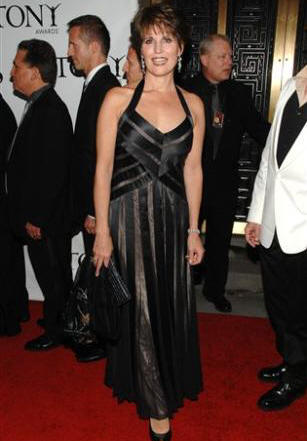 You were steadily working and preoccupied during the height
of the sixties cultural revolution. Did you ever feel like you
missed out on any aspect of that era?
You were steadily working and preoccupied during the height
of the sixties cultural revolution. Did you ever feel like you
missed out on any aspect of that era?
I think
I was as lucky as I could possibly be because, believe it or not, I
was so involved in theater and my drama department in school. This
was the start of the whole hippie thing, and drugs. I missed it
entirely. Almost all of my girlfriends got totally involved with the
whole drug scene. Most of them survived it. I was too interested in
the show and getting the sets up. I didn’t have time. Somehow, I
just never got involved. It’s almost like I didn’t get a sweet
tooth, so I didn’t get cavities. I look back on it now and wonder if
I’m some kind of prude, but in reality, I started my life sooner
than [my girlfriends] did.
Your brother, Desi Arnaz, Jr., co-starred on
Here’s Lucy
with you, but he did participate in the counterculture.
My
brother was not quite so lucky. He started earlier. He was in [the
pop singing group] Dino, Desi and Billy when he was eleven. And then
he was a movie star when I was fifteen or sixteen years old. He was
already this heart throb. And he pretty much got into everything.
He’ll be the first one to tell you. He gave speeches around the
country for years after that to say that he almost died. He was
gone. And now he is, thank God, sober many, many years. It’s rough
when you start that early.
I am
very proud of him. He went through a lot, and his head is in a very
good place. He has a lot of spirituality about him. He’s not
interested in all this hoopla anymore. He lives in a very small
town. He runs a theater there. He lives a very simple life and he
could care less about the rest of it.
He came
to New York to play percussion for me at the big tribute we did at
the 92nd Street Y. I asked Desi to come in and play
percussion, because I couldn’t imagine doing this without him. He’s
the best percussionist I know. He doesn’t do it all that often but
he’s still the best percussionist I know. And he did. He came in,
which was HUGE. You have no idea how huge this was. He hates to
travel. He doesn’t like to leave where he lives. He’s not interested
in all this. But he did it. He did it for me, and he did it for Dad.
He wanted it to be right.
Do you get star struck?
Not too
much. Sometimes I do. I used to live in the same building as Meryl
Streep. We used to have Christmas parties together, and to this day
when I see her, I don’t know what to say to her. I am in such awe of
the talent that is there.
The
other night I went to see a Chris Walken play on Broadway and I met
him several times. He’s kind of a wacky, wonderful, interesting guy.
But once you see him do brilliance on the stage for two hours, if he
would have come to say hello to me after the show, I wouldn’t have
known what to say to him. I would have been completely star struck.
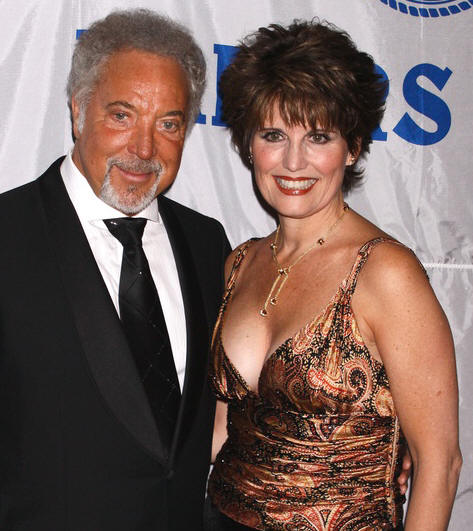 What is it about being on stage that thrills and excites
you?
What is it about being on stage that thrills and excites
you?
Because
it’s all about your ability. I’m a good rehearser. My mother taught
me that. Even in the four days we had to do our show, we really
rehearsed a lot. And when you left the set at six o clock, you’d
better go home and rehearse some more. You need to know this stuff
like the back of your hand. So when the audience shows up on
Thursday night, you’re going to do it once straight through and
you’re not going to make any mistakes. No retakes, unless a set
falls apart. Today, these three-camera shows keep the audience for
seven or eight hours. It’s insane. And people think nothing of
retakes, again and again.
Your very first Broadway show was a smash hit:
They’re Playing
Our Song. What was that experience like for you?
That was
– can you believe it – thirty years ago. [Co-star] Robert [Klein]
and I still go out and do symphony dates now. And it still works.
We’re playing ourselves at this age. We’re not playing thirty year
olds. It was a great experience for my first Broadway show to be
associated with Neil Simon and Marvin Hamlisch. I was very lucky in
this career so far.
Of course, everyone remembers you in the remake of
The Jazz
Singer, with Neil Diamond.
That
came right at the end of They’re Playing Our Song for me. I
had to leave the show in order to do that. That was okay, because I
was about to get married anyway. The day I left to do it, they
fired the director of The Jazz Singer and I sat for two weeks
in Los Angeles, not knowing whether I had a movie. I had left my
Broadway show! I was thinking, okay, this was a terrible idea. But
then they hired Richard Fleischer and the movie turned around and it
was quite fun to do.
The
critics killed it but the people loved it. There is an award given
out every year called the Cinema Scope Award. They award it by
polling people leaving the theater, taking surveys. That year,
The Jazz Singer won above Ordinary People, because the
people liked it.
Laurence
Oliver, they crucified him, and poor Neil, he’ll probably never want
to do another movie as long as he lives. I escaped with my skin
intact. They did not burn me at the stake. It doesn’t really matter,
because the CD went triple platinum, and to this day, people come up
to me and say that The Jazz Singer is their favorite movie
ever.
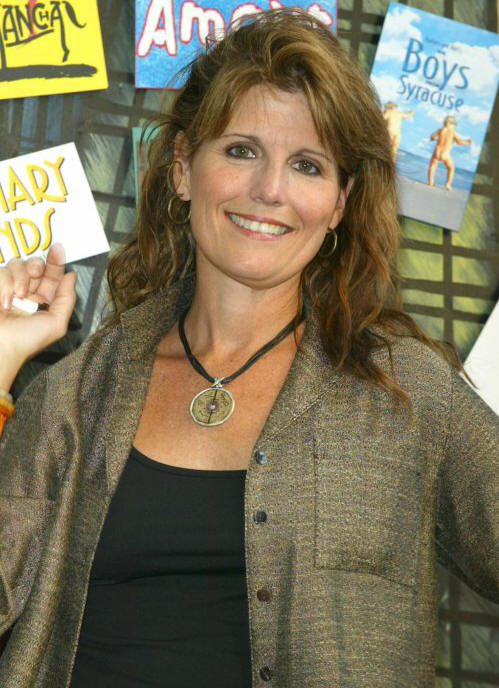 Are you computer literate? Are you on the internet?
Are you computer literate? Are you on the internet?
I don’t
know how computer literate I am, but I am on the internet. I do
email. I sit here way too many hours. When I finally got into all of
this, a friend of mine emailed me and said, “Welcome to the end of
life as you knew it.”
Sometimes I think it is really rude when you go to dinner and
someone with a cell phone or an iPhone is with you, and you’re
talking to them and they’re checking [their devices]. It’s wrong.
There is some etiquette that we have to learn to incorporate into
our lives if we’re going to have this stuff so that we don’t lose
normal civility.
What do you think of the world of entertainment today?
It’s
moving so fast that I can hardly keep up with it. But if you hang in
there, there is good that can be made from all of this.
I think
there is some great reality TV to go along with all the wacky
reality TV. There is a reality show called Super Nanny that I
think is one of the best shows out there as far as saving the
planet. Truly! I think, damn, why wasn’t she there when I was
raising kids? Because it’s true, kids can be so screwed up. The
parents are not on the same plane. When you start watching that
show, you go, “Oh, my gosh, look at those kids! They are such
terrors! Oy, you want to smack them! “ And then ten minutes
into it, you realize that it has nothing to do with the kids. The
kids are begging, “Please, someone, show me how to be a human
being!” And it is usually the parents, with all their goodwill and
good intentions, sending them such mixed messages that they have
created little monsters.
The kids
are tomorrow. If we don’t get our kids right, the world is doomed.
So there is a great reality show right there. And there is a great
reality show in Extreme Home Makeover, because it’s everybody
pitching in to make something better. Yes, you get your product
placement, but that’s called the barter system: I do something good
for you and you do something good for me. That’s how farmers
started way back when: I give you get a chicken, you give me a
chair. And it’s a wonderful thing. It makes you feel good. Somebody
helping somebody.
We can
be kind to one another. We can’t do much else in this crazy world,
but we can be kind.
To keep up with Lucie, and to order her CD, go to
www.luciearnaz.com.
Email
us Let us know what you
think.